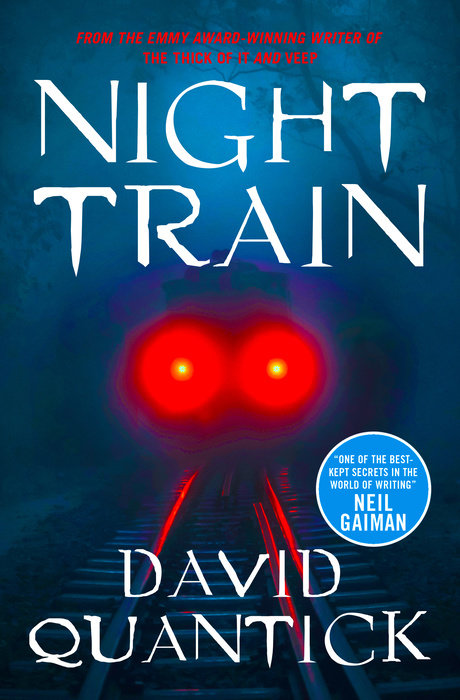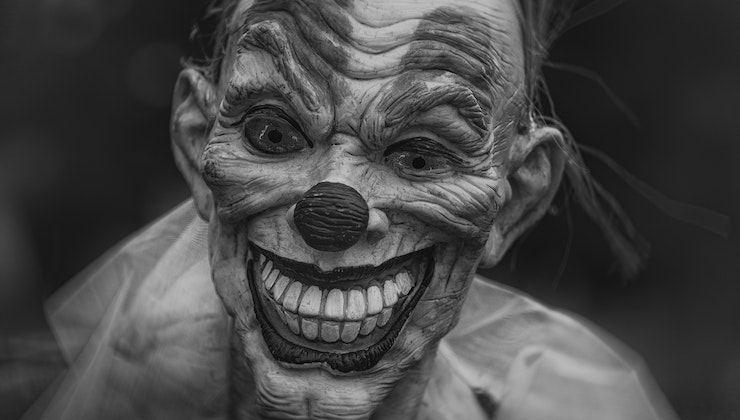A man goes to see the doctor and tells him, “Doctor, I’m depressed, I can’t eat, I can’t sleep. For me, life has lost its flavor.” The doctor says, “You need taking out of yourself! Listen, the great clown Grimaldi is playing tonight. Why not go see him?”
The man screams, takes out a knife and slices through the doctor’s throat. Hacking off the doctor’s head, the man picks it up, still dripping, by the hair and shouts in its blood—spattered ear, “But doctor, I hate clowns!”
Something like that, anyway. Clowns are, of course, just one example of where horror meets comedy. From Stephen King’s It to Bobcat Goldthwait’s Shakes The Clown (a movie that’s both hilarious and horrible), there’s something disturbing about those gurning, plastered-white faces. Add children to the mix, and you have a horror story waiting to happen. It’s not just clowns, either. The relationship between horror and comedy is a very long and very close one. Remember that old phrase: comedy is tragedy plus time. This is a very strange way of seeing the world but it’s true: whether it’s war, violence, murder, suicide and worse, one day someone is going to laugh about it (and these days it’ll be sooner rather than later, as “too soon” becomes a date concept). It doesn’t matter how horrific the tragedy is, one day it’ll just be a punchline. (if you don’t believe me, watch the BBC children’s TV show Horrible Histories, which is just a catalogue of death and disease with songs).
There are horror stories, many horror stories, which aren’t at all funny. There are few laughs in M.R. James, and no laughs at all (intentional ones, anyway) in H.P. Lovecraft. And there are plenty of comedies without any horror (which is annoying: think what a great movie Four Weddings And Then Four Funerals would be). But think of the sheer volume of movies and books and TV shows that combine both: from Scooby-Doo to Shaun Of The Dead, from the Scream franchise to the Evil Dead movies, horror and comedy go together like a horse and another horse, both tied together and screaming as they’re pushed into a ravine. Think, too, of the 1950s horror comics, where each grim and gory tale ends with the rotting-skulled narrator going, “Heh heh heh”.

Apple | Bookshop.org | Amazon | Barnes & Noble | IndieBound
Horror and comedy fit together so well for one reason: we all die. All of us. We’re all going to die, and there’s nothing we can do about it. Therefore everything we do is arguably pointless. Why fall in love? Why go for a meal? What’s the point of haircuts? Tennis? Clowns? Whatever we do is going to end in tears shed around a long box on a trestle table. And yet we keep on doing stuff. We take those holidays, go on those dates, read those books, and we live our fairly short lives. The whole thing makes no sense: we act like our lives will never end, when in reality we’ve got until next Wednesday before the whole thing comes to a halt. Our reactions to this state of affairs are varied. Some people, faced with the inevitability of death, cut to the chase, and end it all. Others decide that death is a hoax, like vaccines and the Moon landings, and choose a way of thinking that involves an afterlife. Most of us just get on with it, not thinking about things too much, but maybe reasoning – if we’re among the lucky ones – that the time we have is at least ours and we can make as much or as little of it as we want to.
Sometimes, though, people want to step back a little and comment on the absurdity of it all, and the best way to do this, or rather the best two ways, are horror and comedy. Horror is a brilliant way of being honest about things: horror says that the world isn’t like children’s books, that there are no happy endings, and that REALLY BAD THINGS happen all the time. Of course, being horror, it tends to exaggerate all of this, so the REALLY BAD THINGS tend to be not, say, getting fatal diseases or crashing your car, but being eaten from the inside by a giant fungus. (In many ways, horror is like a little kid who interrupts your explanation of where lambs come from to shout, “I know! I know! And then the farmer boils them alive and that’s how we get the best wool!”). Horror can be depressing, and it can be exciting, so that at the end of the movie or the story, we feel both catharsis and foreboding, as though you’ve been on a crazy rollercoaster ride and survived it, but right at the top of the ride you think you saw your house being attacked by huge demons.
But comedy takes a different approach. Comedy says the world is a terrible place, and this is ridiculous. If horror is the subjective primitive self, reacting emotionally and fearfully to everything, then comedy is the (slightly) evolved intelligence, which allows us to step out of ourselves for a moment and see things objectively.
Horror says, “There is evil in this world. You should be afraid.”
Comedy, however says, “Yes, the world is bad, boo the fuck hoo. Isn’t it funny?”
A man visits his friend in hospital, who has been stabbed seventy times by unknown assailants. Every organ in his friend’s body has been pierced, slashed, sliced, and damaged, yet somehow he clings to life.
The man sees his friend lying there, bandages fresh and white beginning to blossom red in a hundred places and, because he can’t stop himself, says: “Does it hurt?”
“Only when I laugh,” his friend replies.
Comedy and horror are two sides of the same bloody coin. No matter how awful a horror story is, it’s still rooted in the idea that humanity matters and that being alive is important: and no matter how fluffy a comedy is, it’s still a reaction to someone else’ misfortune (even if that misfortune is just a cartoon duck getting a wet backside). Horror stories may say oh no, we’re going to die, but that’s just because they really mean oh yes, I want to live. Comedy appears to say ha ha, laughing is good for the soul, but it’s actually saying it’s fun to be mean (remember that old saying, “Tragedy is when I cut my finger, comedy is when you trip and break your neck”?).
Horror and comedy, comedy and horror: when you put them together, they’re amazing. Your reader or viewer will be laughing then crying, nodding sagely then screaming in terror, and generally experiencing a massive spectrum of emotions in two or so hours that a serious novel or play could never hope to induce. It’s fun to scare people, and it’s doubly fun to do it and make them laugh. I wrote a short story about a man who is, not to put too fine a point on it, internally infiltrated by an electric toothbrush, and the story’s conclusion – when the toothbrush, still vibrating, finds its way out of the man – made me gasp and laugh both at the same time. Similar effects have been achieved, to much greater heights of horror and comedy, in thousands of books, movies and stories, and these moments, I maintain, are the heights of both comedy and horror. Two sides of the same coin, dripping blood from a laughing face, forever.
David Quantick is an Emmy Award-winning television writer for such shows as Avenue 5, Veep, The Thick of It and The Day Today. He is the author of Night Train, All My Colors, Sparks, The Mule, and two writing manuals: How To Write Everything and How To Be A Writer.




One thought on “Laugh ‘Til You Scream: David Quantick on Comedy and Horror”